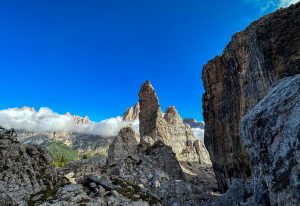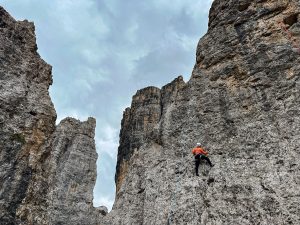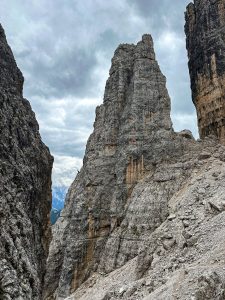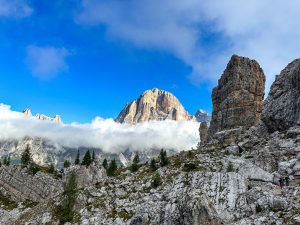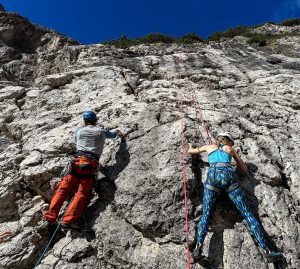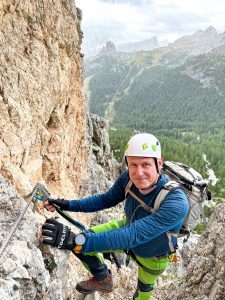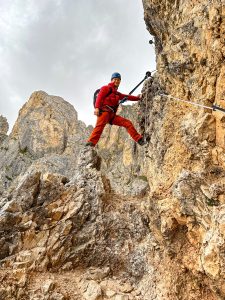WHAT WE ACHIEVED
PHASE 1:
Novice climbers, many of whom were completely new to the sport gained the required knowledge to safely climb using a top rope on a sport climbing route. Students with previous experience were able to gain valuable log book days, in preparation for the Rock Climbing Supervisor qualification.
PHASE 2:
Once students had gained sufficient experience and were deemed competent, they progressed to learning how to lead climb. This technique put the skills learned earlier in the course to the test. The top rope is removed and instead the lead climber is responsible for setting the route by clipping their rope to fixed bolts using quickdraws. Lead climbing pushes individuals mentally, as well as physically because the “safety net” of the top rope is taken away. While the lead climber is still protected, the distance they may fall is increased significantly, meaning the risk of injury is higher and thus the psychological pressure on the individual is increased.
PHASE 3:
A crucial exercise aim was for the novices in the group to walk away with the Rock Climbing Single Pitch Foundation Award. Due to the enthusiasm of the students and excellent instructor ability, this was achieved early on in the week. Which meant everyone was able to experience an introduction to via feratta. Another bonus to the course was that nearly all students successfully completed a multi-pitch climb. The Italian Dolomites is hailed one of the best climbing locations in the world and is particularly renowned for its multi-pitch routes, which span up impressive vertical limestone faces, with maximum exposure. It was an amazing achieving for people who had never climbed before setting foot in Italy, to then be doing routes which were 3 pitch’s in length. The multi-pitch routes not only require a greater endurance, but also either a head for heights or steady nerve!
WHAT WENT WELL & NOT SO WELL
The environmental pressures faced on the EX NORTHERN DOLOMITES SERPENT 23 are transferable in an operational environment. A good example of this is coping mechanisms when in a high pressured situation. Despite the exhilaration of climbing, it is essential to maintain composure; staying calm, focused and ensuring the correct technique is followed at all times.
A lapse in concentration of a belayer can have drastic consequences for a climber. Climbing therefore forces one to place trust in their comrades, a skill that is often overlooked, but again, essential in an operational environment.
Students who are afraid of heights were able to conquer their fears, improving confidence.
LESSONS LEARNT
The exercise ran smoothly.
On reflection, the nature of the exercise and the required instructor ratio meant groups were split down into small numbers. In order to improve cohesion within the unit, accommodation with a shared living space would be advantageous.
While we were fortunate with the weather for the majority of the exercise period; September is classed as the off-season in the Dolomites and weather can often be unpredictable during this time. Future exercises in the Dolomites would benefit from the summer months, to allow maximisation of outdoor spaces.
Accommodation in a more central area, such as Cortina d’ Ampezzo would mean less travel time each day and more time training.
“EX NORTHERN DOLOMITES 23
After having an idea and sharing this with the CoC, I was given an excellent opportunity to plan and lead a Rock Climbing Exercise to the Italian Dolomites. As a junior rank, the execution of the exercise in itself has given me invaluable leadership skills, not to mention what myself and my comrades gained from the adventurous training package.
The instructors were very knowledgeable and shared their expertise, taking the time to go though areas of individual weakness. I was grateful to be able to thoroughly go through areas where I had minimal experience, such as rope work.
Coming away from the exercise I feel inspired to pursue climbing further. I now have the confidence to be able to climb both independently as an individual and also within the Army.
Looking forward, I plan to imminently apply for Rock Climbing Supervisor course and in doing so, help my unit being self sufficient when delivering AT packages.
As a group we were fortunate to be able to conduct training in such a beautiful location. The exercise facilitated an improvement of mental resilience, climbing skills, general fitness and also unit cohesion, while simultaneously working as a retention tool due to the enjoyable nature.”
CORPORAL AMY STALLARD | 212 (YORKSHIRE) FIELD HOSPITAL

